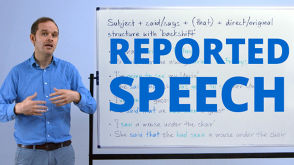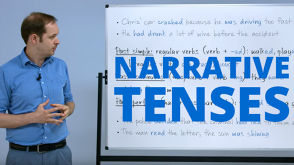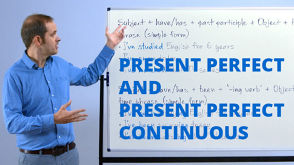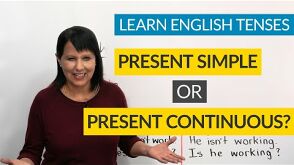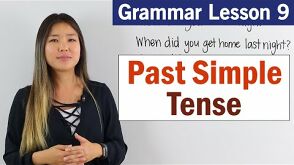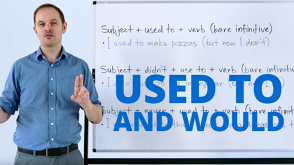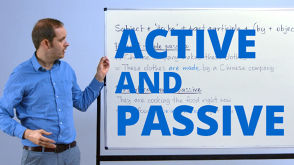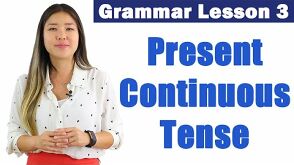Learn real English from movies and books.
Add words or phrases for learning and practice with other learners.
-
STEP 1Watch the video

-
STEP 2Do the exercises

-
STEP 3Add phrases you like to Favorites

Present perfect simple and time adverbs
- 00:00 / 00:00
Click on a word or highlight a phrase to see translation
Click on a word or highlight a phrase to see translation
Click "plus" to add word/phrase for learning
Click "plus" to add word/phrase for learning
Start learning
Start learning
Present perfect simple and time adverbs
The present perfect simple has numerous functions in the English language. We can use it to link the past to the present, to show the present result of an activity in an unspecified time in the past and also we can describe life experiences with the present perfect simple. When a user of English wants to add detail to their present perfect simple sentences there a number of adverbs that can be added in the sentences to give more information
Affirmative sentences
|
Sentence |
Form |
Explanation |
| I've just done the shopping |
Subject + have/has + just + past participle + object |
Here the present perfect is used to describe the present result of past activities. Just is used to describe the fact that the activity has very recently been completed |
|
We've already seen this film |
Subject + have/has + already + past participle + object |
Already used with the present perfect describes the fact that the activity is not a new experience. In this example, a film has been seen before by the speaker |
|
You've visited this country before |
Subject + have/has + past participle + object + before |
Here we have the present perfect simple describing an experience. The adverb before clearly indicates that the experience is not a new one. |
|
I've still got your cat |
Subject + have/has + still + past participle + object |
Present perfect simple with still describes an activity that started in the past and is continuing up to the present. The speaker in this example is saying that they have had their friend's cat and have it now as well. |
|
I have always loved chocolate |
Subject + have/has + still + past participle + object |
When we use always with the present perfect simple we are describing an experience/feeling about something that has been true for the lifetime of the speaker- They have loved chocolate forever |
|
I've lived here since January 2000 |
Subject + have/has + past participle + since + time phrase |
When we use since with the present perfect simple we describe in detail an experience/activity in terms of a specific moment in time. In this case, the speaker lived somewhere in 2000 and they are living there today. |
|
I've been here for 2 hours |
Subject + have/has + past participle + for + time phrase |
When we use for with the present perfect simple we describe in detail an experience over a period of time. In this case, the speaker has been somewhere for 2 hours |
Negative sentences
|
Sentence |
Form |
Explanation |
|
I've never been to that doctor |
Subject + have/has + never + past participle + object |
When never is used with the present perfect the sentence created has a negative emphasis. A speaker describes an experience that has not happened ever |
|
He still hasn't done his homework |
Subject + still + have/has + not + past participle + object |
When a speaker of English uses still in a negative present perfect sentence, we describe an activity or experience that we are waiting for because it still hasn't happened |
|
I haven't always done my hair this way |
Subject + have/has + not + always + past participle + object |
If we use always with negative present perfect simple sentences, we are probably describing something that has recently changed. In this example, the speaker's hair is now different because previously, the didn't have their hair this way |
|
I haven't seen you here before |
Subject + have/has + not + past participle + object + before |
The use of before in negative present perfect sentences clearly shows us that the experience or activity being described is happening for the first time because in the past, it did not. |
|
I haven't finished work yet |
Subject + have/has + not + past participle + object + yet |
A very common adverb used with the present perfect negative sentences is yet. If we use yet with negative present perfect sentences we are describing an activity that has not happened but will hopefully soon. |
|
He just hasn't understood the question |
Subject + just + have/has + not + past participle + object |
Just used in negative present perfect sentences is used to emphasize the activity not being completed. |
Question forms
|
Sentence |
Form |
Explanation |
|
Have you been to the new shopping centre yet? |
Have/Has + subject + past participle + object + yet +? |
When we use yet in a question, we are asking someone about an activity that we expected to be completed but we are waiting for it to be done |
|
What have you already eaten? |
Question word + have/has + subject + already + past participle + ? |
With already, the question formed is asking about an activity that has been done before or is repeated |
|
Have you just got back? |
Have/ Has + subject + just + past participle + object + ? |
Just in a question asks about an activity that has (or has not) been completed very recently |
|
What has he always enjoyed? |
Question word + have/has + subject + always + past participle + ? |
Always in a present perfect question is asking about someone's entire life. |
|
Have you still got any mushrooms? |
Have/ Has + subject + still + past participle + object + ? |
When we use still in present perfect questions, we are asking if something from the past has continued into the present |
|
Has she ever been there before? |
Have/ Has + subject + never + past participle + object + before + ? |
When we ask a present perfect question with ever and before we are asking about the experiences someone has or has not had in the context of their entire life |
The word order of the adverbs is fixed so you must be careful when constructing sentences like these. If adverbs are placed incorrectly in a present perfect simple sentence the result is unnatural English
Have you finished it yet NOT Have you finished yet it
I still haven't found your camera NOT I haven't still found your camera
She has just gone NOT She has gone just
Similar video exercises
Click on a word or highlight a phrase to see translation
Click on a word or highlight a phrase to see translation
Click "plus" to add word/phrase for learning
Click "plus" to add word/phrase for learning



